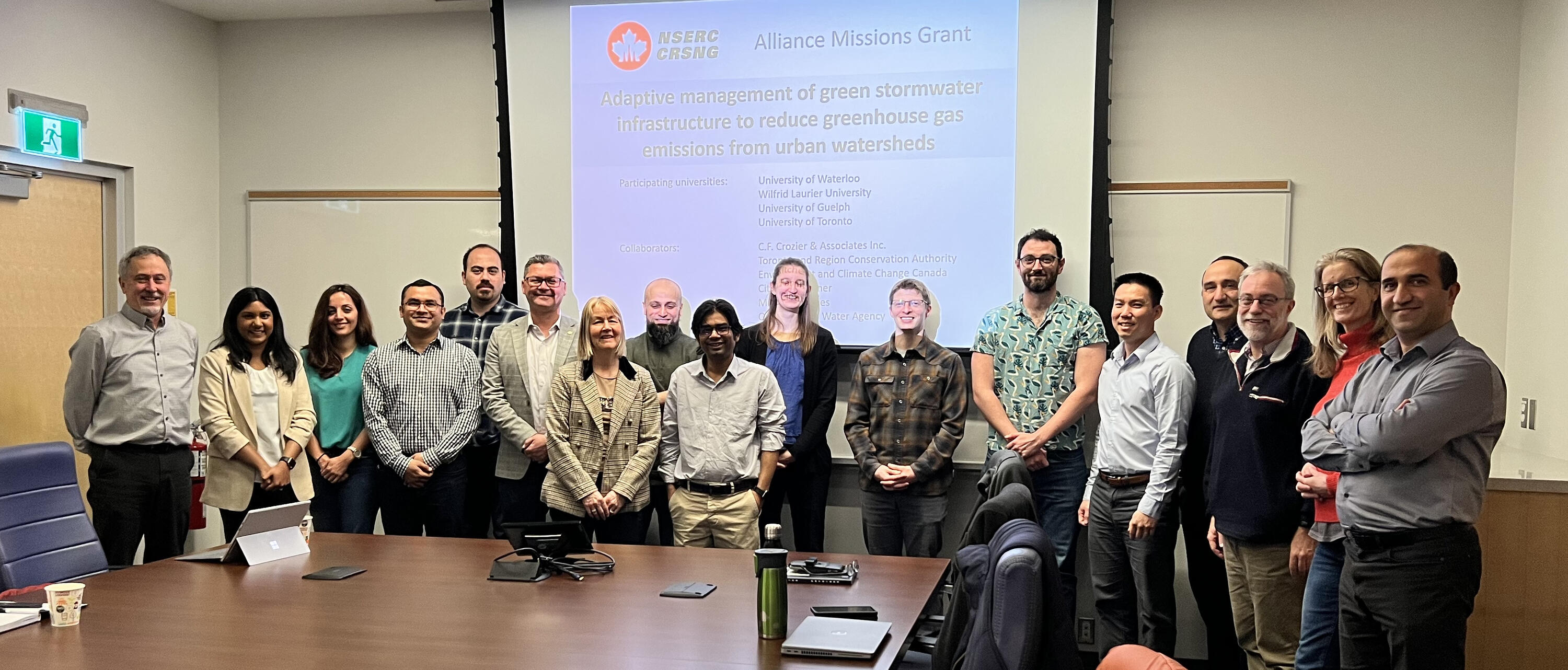
Photo: Stormwater management pond by Hooman Reza Nezhad
Congratulations to Water Institute researchers who have been awarded Natural Sciences and Engineering Research Council’s (NSERC) Alliance Missions Grant funding as part of the 2022 competition.
The Ecohydrology Research Group (ERG) recently announced funding of $1,348,540 for a new collaborative research project entitled “Adaptive management of green stormwater infrastructure to reduce greenhouse gas emissions from urban watersheds”, which will span 3 years 2023-2026.
Led by Dr. Philippe Van Cappellen, the ERG group hosted the project kick-off meeting on April 25, with researchers and collaborators from the University of Waterloo, Wilfrid Laurier University, University of Guelph, University of Toronto, C.F. Crozier & Associates Inc., Toronto and Region Conservation Authority, Environment and Climate Change Canada, City of Kitchener, Muslim Families Development Corporation, and the Ontario Clean Water Agency.

Photo: Project kick-off meeting. The project is led by Drs. Philippe Van Cappellen (PI), Fereidoun Rezanezhad, Andrea Brookfield, Bahram Gharabaghi, Elodie Passeport and Scott Smith.
Worldwide, stormwater management (SWM) systems are being expanded and retrofitted to counter the negative impacts of urbanization which include increased flooding, water quality degradation and eutrophication of receiving aquatic ecosystems.
In Canada, stormwater ponds (SWPs) are the standard technology for new developments although other green technologies, especially bioretention systems (BRSs), are increasingly being used. Whether these new technologies also support positive climate benefits remains unknown, however.
SWPs and BRSs have been shown to be significant sources of the greenhouse gases (GHGs) such as carbon dioxide, methane and nitrous oxide. However, they also sequester carbon (C) and reduce the surface runoff of nutrients such as phosphorus (P), altering nutrient limitation patterns, trophic conditions, and GHG exchanges along the urban aquatic continuum and in receiving water bodies.
To determine if SWPs and BRSs exacerbate or mitigate climate forcing, the project will evaluate their net effects at the watershed scale. Specifically, the project will quantify the landscape-scale drivers and processes within SWPs and BRSs that control GHG exchanges, C sequestration, and changes in the chemical speciation and fluxes of C and P. The resulting knowledge will then be integrated into robust representations of SWPs and BRSs in coupled hydrology-biogeochemistry models for urban watersheds and model simulations will be used to analyze the responses of urban GHG emissions and nutrient P export to the construction and management of green SWM infrastructure.
Focussing initially on urban watersheds in southern Ontario with SWPs and BRSs whose hydrology and biogeochemistry have already extensively been characterized, results will lay the foundation for expanding the model across Canada.
The project's municipal and industrial partners will use the project's outcomes to carry out interventions that reduce GHG emissions from existing SWPs and BRSs and develop leading-edge green SWM strategies that minimize trade-offs between climate mitigation benefits and other key services in particular, water quality protection.”
This is a very exciting project that has tremendous potential to inform the climate action plans of Canadian cities. The project will also offer many opportunities for academic researchers to collaborate closely with practitioners, decision-makers and citizen scientists,” said project lead Dr. Philippe Van Cappellen.
The funding from the NSERC Alliance Mission Grants program encourages university researchers to collaborate with partner organizations, from the private, public or not-for-profit sectors. The grants are a unique opportunity to accelerate the translation of Canada’s world-class research results into economic opportunities and inform policy that could have positive impacts on Canada’s economy.